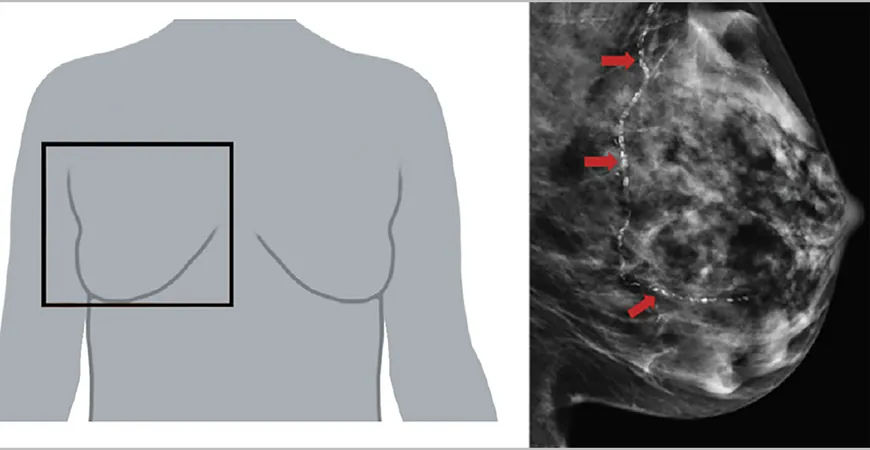
Shocking New Study Reveals Link Between Breast Artery Calcification and Heart Risks in Women!
2024-10-07
Author: Nur
Overview
Breast artery calcification (BAC), a finding often casually observed during mammograms, has been linked to significant cardiovascular (CV) risks among women. Recent research led by Dr. Tara Shrout Allen and Dr. Quan Bui from UC San Diego has utilized advanced artificial intelligence (AI) to quantify this incidental finding, unveiling its profound implications for women's health.
Key Findings
The results, published in JACC: Advances, indicate that the presence of BAC correlates with increased risks of all-cause mortality and a composite range of severe cardiovascular events—including heart attacks, strokes, and heart failure—especially in younger women aged 40 to 59. Even when traditional CV risk factors were taken into account, the study found that BAC was an independent predictor of adverse CV outcomes.
Implications for Health
"Automated AI algorithms allow for reliable reporting of BAC, paving the way for its integration into routine mammography evaluations," the researchers noted. They believe that understanding BAC could lead to personalized cardiovascular disease risk assessments, ultimately guiding women toward preventive health measures.
Addressing Women's Health Concerns
The urgency of this finding cannot be overstated. Living in a fast-paced world, many women overlook vital health conversations. "The presence of BAC should inspire discussions about lifestyle changes to lower cardiovascular risks," said Dr. Allen. Experts like Dr. Ana Barac from Inova Schar Cancer underline that although the discovery of BAC is alarming, it’s not a cause for panic. Instead, it's an opportunity to take control of one’s health by evaluating known cardiovascular risk factors.
Study Demographics
BAC is generally regarded as a straightforward, non-invasive marker visible on mammograms—a routine screening method for women over 40. Given its accessibility, researchers advocate for utilizing BAC as a tool for cardiovascular risk stratification, as it involves no additional costs or radiation exposure to patients.
Research Statistics
The study analyzed data from over 18,000 women ages 40 to 90, highlighting that 23% of the participants exhibited signs of BAC, with a median score of 15 for those affected. Those with higher scores tended to belong to demographics already predisposed to cardiovascular conditions—making BAC a compelling early indicator for potential health issues.
Specific Risks for Younger Women
Notably, the findings were most pronounced in younger women. For those aged 40 to 59, adjusted hazard ratios indicated a significant association between BAC and increased mortality and composite outcomes, urging a reevaluation of how CV risks are managed in this population.
Future Research Directions
Despite the promising prospects of BAC in CV risk assessment, Dr. Barac clarified that many questions remain unanswered, particularly concerning cause-specific mortality relating to BAC. With no established treatment routes available, the research community emphasizes that women with detected BAC should not only stay vigilant but should also engage in active dialogue with their healthcare providers about managing their CV risk factors.
Call to Action for Healthcare Policy
Amid ongoing discussions about adjusting healthcare policies for awareness and reporting standards for BAC, experts urge the American College of Radiology to step in and help standardize this finding in mammogram reports. Ensuring that patients are well-informed about the implications of BAC could lead to breakthroughs in preventive cardiovascular health strategies.
Conclusion: What Now for Women?
While the findings leave us with more questions than answers, they certainly highlight the importance of understanding individual cardiovascular risk profiles. Women must seize the initiative to discuss any findings with their doctors, ensuring that their heart health is prioritized amid the plethora of routine screenings. Remember, knowledge is power, and there’s no better time to start paying attention to your heart!


 Brasil (PT)
Brasil (PT)
 Canada (EN)
Canada (EN)
 Chile (ES)
Chile (ES)
 España (ES)
España (ES)
 France (FR)
France (FR)
 Hong Kong (EN)
Hong Kong (EN)
 Italia (IT)
Italia (IT)
 日本 (JA)
日本 (JA)
 Magyarország (HU)
Magyarország (HU)
 Norge (NO)
Norge (NO)
 Polska (PL)
Polska (PL)
 Schweiz (DE)
Schweiz (DE)
 Singapore (EN)
Singapore (EN)
 Sverige (SV)
Sverige (SV)
 Suomi (FI)
Suomi (FI)
 Türkiye (TR)
Türkiye (TR)